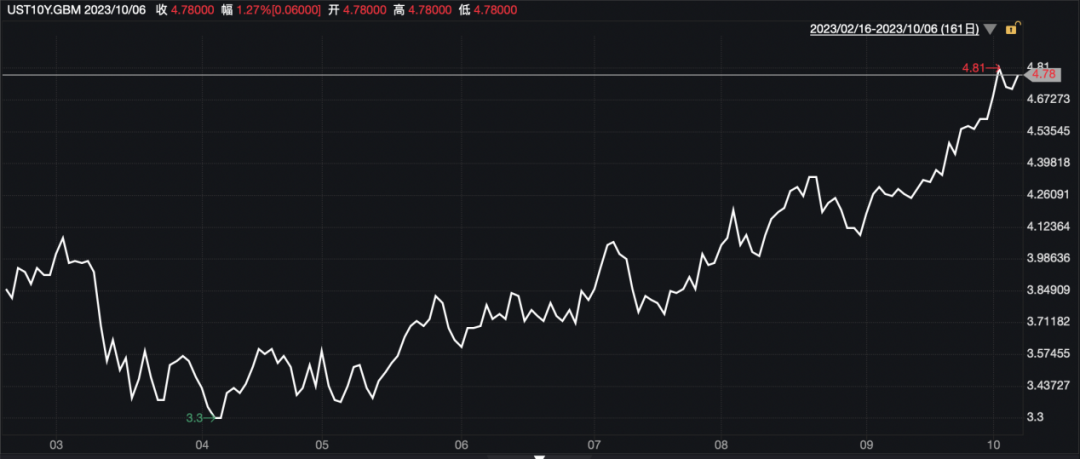
U.S. Treasury bonds have always been hailed as the "anchor of global asset pricing," and the yields on U.S. Treasury bonds have surged again recently. The yield on 10-year U.S. Treasury bonds broke through the important 5% mark during the session, hitting the highest level since 2007.
The continued surge in U.S. Treasury bond yields has aroused widespread concern in global financial markets. This trend will not only have an impact on the U.S. economy, but will also spread to global financial markets. There are three main reasons for the surge in U.S. bond yields: First, economic recovery. The U.S. economy has gradually recovered since the trough of the epidemic. GDP growth in the first half of the year was higher than expected, and the job market continues to be hot. Increased market expectations for U.S. economic growth have prompted investors to move funds into riskier stock markets and corporate bond markets, keeping long-term U.S. bond yields on an upward trend. The second is inflation. Although U.S. inflation has declined, it is still well above the Fed's control target, and core inflation is still at a relatively high level. At the same time, the recent increase in oil prices has also put upward pressure on inflation. The high level of inflation has left U.S. bond yields lacking the motivation to fall significantly. In order to combat inflation, the Federal Reserve may take measures such as raising interest rates, thus pushing up Treasury yields.The third is monetary policy. The Fed's monetary policy has a direct impact on Treasury yields. For example, when the Federal Reserve implements tightening monetary policy, the cost of market funds rises, which in turn pushes up Treasury yields. The fourth is geopolitical conflicts. Recently, tensions and instability have emerged in many regions around the world, making the market worried that they may trigger larger-scale conflicts and crises. Such as the Palestinian-Israeli conflict, the Russia-Ukraine war, and renewed tension on the peninsula. These situations have not only raised global inflation expectations, but also increased risk aversion in global financial markets. Therefore, U.S. bonds need to offer higher interest rates to compensate for the higher risk they bear.
What impact will the surge in U.S. bond yields have on global assets? First, it triggered a decline in global stock markets. The investment value of medium- and long-term bonds has gradually increased. Some long-term buyers, including banks, insurance companies, and sovereign funds, will repurchase medium- and long-term bonds to lock in higher long-term yields, making the relative attractiveness of stock returns less attractive. Second, the U.S. dollar is strengthening. Rising U.S. Treasury yields could cause the U.S. dollar to appreciate as investors choose to move funds into less risky U.S. dollar assets. This will put depreciating pressure on other currencies, especially those of emerging market countries. Third, the rise in U.S. bond yields has a dual impact on the bond market. On the one hand, rising Treasury yields mean that bond prices fall, putting pressure on the bond market; on the other hand, rising U.S. bond yields may attract global investors to buy U.S. bonds, thereby pushing up bond prices. Finally, rising U.S. bond yields may lead to an acceleration of international capital flows to the United States, thereby exerting capital outflow pressure on other countries, which may trigger currency crises and economic turmoil.
The surge in U.S. bond yields has had a profound impact on global financial markets. Nowadays, the strong fiscal stimulus in the United States has been overdrawn and unsustainable. Even if the budget deficit next year remains at the currently planned high of 6.8%, due to the significant increase in the proportion of interest expenses, the United States will turn to a substantial fiscal contraction next year, and the economy is likely to A recession that exceeds market expectations will occur, and the U.S. dollar will enter a depreciation cycle that may last for several years. In addition, the continued rise in U.S. Treasury bond yields will siphon capital from economies other than the United States, further weakening the economic growth prospects of Europe, Japan and other non-U.S. economies.

Recently, according to 9To5Mac, the Apple Podcasts app was exposed to have the problem of automatically redirecting unsubscribed programs, and some of the redirected programs were suspected to contain malicious links.
Recently, according to 9To5Mac, the Apple Podcasts app was …
Recently, multiple Federal Reserve officials have publicly …
Ukrainian President Vladimir Zelensky met with French Presi…
In November 2025, South Korean e-commerce giant Coupang was…
On December 2, 2025, the international silver market witnes…
On November 30 local time, a report released by the Stockho…